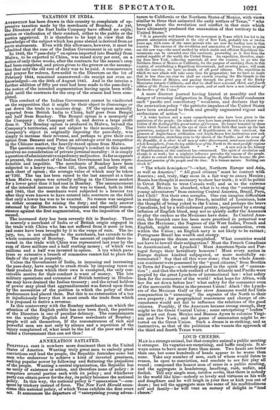TAXATION IN INDIA.
Apritrirrow has been drawn in this country to complaints of op- pressive taxation made by the merchants of Bombay. As yet, the Directors of the East India Company have offered no expla; nation or vindication of their conduct, either to the public or the parties aggrieved. It is therefore to be kept in view that the knowledge of the subject which has gone abroad is derived from ex parts statements. Even with this allowance, however, it must be
admitted that the case of the Indian Government is an ugly one.
In 1843, the "pass-duty" on opium imported into Bombay from Malwa, to be exported to China was raised sixty per cent, on a notice of only three weeks, after China, contracts for the season's crop had been completed, and prices given to the grower on the assump- tion that only the old rate of duty was to be paid. A remonstrance and prayer for redress, forwarded to the Directors on the 1st of February 1844, remained unanswered—its receipt not even ac- knowledged—on the 20th of August 1845. And in the interim a further addition of fifty per cent had been made to the pass-duty ; the notice of the intended augmentation having again been with- held until the contracts for the crop of the season had been com- pleted.
This conduct of the Indian Government cannot be vindicated on the supposition that it might be their object to discourage or put down the trade in a noxious drug. Of the opium annually exported from British India to China, half goes from Bengal and half from Bombay. The Bengal opium is a monopoly of the Company ; the Company sell it, and derive a large profit i
from it. The Bombay opium s produced in Malwa, beyond the Company's territories, and not subject to their monopoly. The Company's object in originally imposing the pass-duty, was simply to increase their revenue, and perhaps to give their own opium from Benares and Patna an advantage over its competitor in the Chinese market, the heavily-taxed opium from Malwa. The question respecting the Company's conduct in this matter involves no consideration of private personal morality: it is simply a question of administrative expediency and justice. A s far as appears at present, the conduct of the Indian Government has been repre- hensible and impolitic. The merchants of Bombay have been subjected to a heavy tax —first 12/., then 20/., and lastly 30/. on each chest of opium - the average value of which may be taken at-120/. The tax has been raised to the last amount at a time when Malwa opium was actually selling in the Chinese market for a lower price than it had cost in Bombay. The announcement of the intended increase in the duty was so timed, both in 1843 and 1845, that the merchants were subjected to a heavier tax after they were known to have entered into contracts on the faith that only a lower tax was to be exacted. No reason was assigned on either occasion for raising the duty; and the only answer returned by the Directors to a temperate and respectful remon- strance against the first augmentation, was the imposition of the second.
The increased duty has been severely felt in Bombay. There is scarcely a merchant of India or of British origin engaged in the trade with China who has not suffered from it more or less, and some have been brought by it to the verge of ruin. The in- jury, too, is not confined to the merchants, but extends to the whole community of Bombay. The amount of capital there in- vested in the trade with China was represented last year by the sum of three millions and a half sterling money ; of which two millions and a half was invested in opium. A tax which para- lyzes so extensive a branch of commerce cannot fail to place the trade of the port in jeopardy.
Unless the Government of India, in imposing and increasing the pass-duty, have sought to crush rivals by imposing taxes on their produce from which their own is exempted, the only con- ceivable motive for their conduct is want of money. The late military operations and extension of British territory in Hindos-
tan may have drained the Indian treasury; and the actual holders of power may plead that aggrandizement was forced upon them by the necessities of the position in which the policy of their predecessors had placed them. But this is no extenuation of a tax BO injudiciously heavy that it must crush the trade from which it is proposed to derive a revenue. In this controversy with the Bombay merchants, on which the attention of the English public has now been fixed, the position of the Directors is one of peculiar delicacy. The complainants are the wealthy English and Parsee merchants of Bombay : people will ask themselves If the remonstrances of rich and powerful men are met only by silence and a repetition of the injury complained of, what must be the lot of the poor and weak under a Government that can act thus?


























 Previous page
Previous page